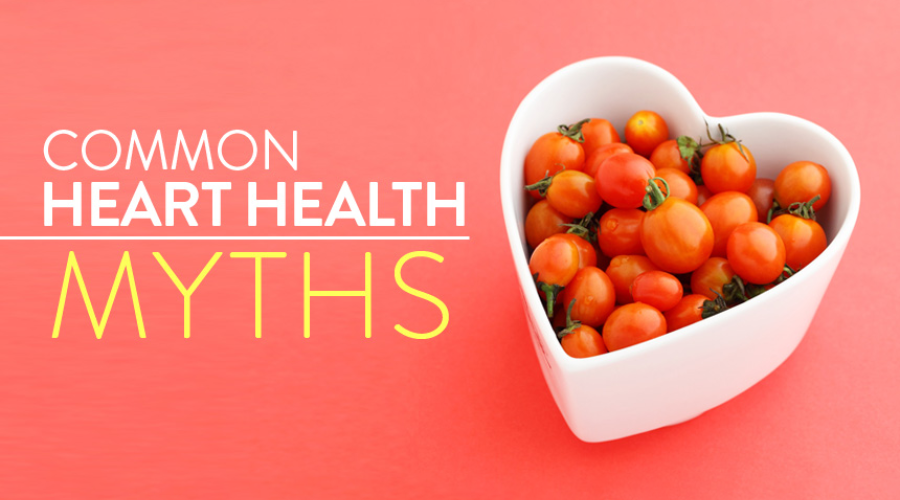
Perhaps the most important heart health myth to dispel right away is that there are no more heart health myths. We hear so much about how to care for our hearts and what signs to watch for that we can easily start to think we’re experts, especially when compared to how little so many of us know about diseases such as cancer and Alzheimer’s. It’s certainly true that we know a lot more about heart care than we knew even a decade ago, but some dangerous myths still persist. Let’s delve into a few of these heart health myths so we can stop believing them.
There’s a lot of heart health myths circulating, so we’ve rounded up some additional heart health misconceptions for you:
Men are more susceptible to heart disease than women.
This is one of the most egregious myths. It is simply not true. In fact, more American women than men die from heart disease each year. There’s also the curious fact that 42 percent of women die within a year of having a heart attack; for men, that rate is only 24 percent. Speculation abounds as to why this might be, but the important takeaway is that women and women’s loved ones must stop thinking of heart disease as a man’s disease.1
A broken heart is just a poetic term.
It turns out that poets throughout the ages were really onto something when talking about “broken hearts.” Extreme emotional distress due to the death of a loved one or the end of a significant relationship, for example, can actually have a significant effect on the heart. The medical term for broken heart syndrome is “takotsubo cardiomyopathy,” and it is believed to be the heart's reaction to a spike in stress hormones. It also affects women in a disproportionate number. While most people make a full recovery, the existence of broken heart syndrome underlines how psychological states can have a very real, very tangible effect on the heart. Even extreme stress caused by work, family issues or other demands is less forgiving on your heart than grief.2
“I’ll feel it coming.”
There is a widespread myth that heart disease usually makes itself known by causing pain, discomfort, dizziness and other symptoms. While any of those symptoms could signal heart disease, you are more likely to feel these symptoms when a heart attack is imminent. The onset of heart disease is often completely unfelt. High blood pressure, for example, often presages the onset of heart disease, but it is called “the silent killer” because it so often goes undetected. For this reason, it is a great idea to perform regular tests on your blood pressure, just the way you’d check the air pressure in your car’s tires.
Cholesterol problems develop in old age.
Young people need to realize just how dangerous this myth is. Sure, growing children can metabolize sugar and fat because they’re using just about every calorie to support their rapid development, but the body stops growing around the age of 21. That means the lard and sugar in junk food has nowhere to go and is often converted by the body into cholesterol. There is also a strong genetic component to cholesterol levels, so younger people should be aware of their family history and monitor their cholesterol with as much tenacity as seniors. As Mark Pletcher, epidemiologist at the University of San Francisco puts it, “Our evidence shows that young adulthood is an important time because lasting damage [due to cholesterol] already starts to accumulate at this age.”3
Mechanical fixes are available.
Modern cardiac medicine has gotten very good — maybe too good, at least in the minds of millions. From stents to pacemakers to implantable cardioverter defibrillators (ICDs), scientists, doctors and the medical industry have worked some real marvels with metal, electricity and tiny gears. Life can be prolonged and symptoms alleviated using these medical advances. But these wonderful tools should not be considered “fixes.” Underlying diseases of the heart do not magically disappear. Some patients have multiple stents put in after the first because his or her system has become prone to clogging.
Statins will take care of it.
Statins are drugs used to reduce cholesterol levels and help prevent heart attacks and strokes. Millions of Americans take statin medications, and they are often very effective, but they should never be considered a substitute for good, old-fashioned, healthy practices. Also, statins are sometimes debated in the medical community4 because of factors such as calculation of cardiovascular disease risk and the ability of statins to reduce risk, as well as some of their unintended consequences, notably disorders that may include symptoms like muscle cramps and pain brought on by the inflammation of muscles. Another unintended consequence of statin therapy is a reduction in the body’s ability to produce coenzyme Q10, or CoQ10, and convert it into its activated form, ubiquinol, which is vital to hearth health and the overall health of the cardiovascular system.
Cardiac arrest and heart failure are the same thing.
Cardiac arrest is the catastrophic event that occurs when the heart stops beating. Heart failure, which is far more common, refers to situations when the heart is compromised by disease. Heart failure can lead to cardiac arrest, but the two are not the same.
“I can't prevent heart disease.”
The final myth that we’ll mention here is probably the saddest. It is the myth of the inevitability of heart disease. People hear stats such as “one in four Americans will die from heart disease this year,” and they begin to believe that heart disease is simply a matter of good luck versus bad luck. While some healthy people will be unlucky, and some unhealthy people will be lucky, the truth is that heart disease is one of the most preventable diseases on the planet, due to risk factors that can be modified. So don’t fall into this fatalistic trap. Eat right, exercise enough, don’t smoke, and let that good, strong heart beat for a good, long time.
References
2. NIH. How is heart disease treated? http://www.nhlbi.nih.gov/health/health-topics/topics/hdw/
3. Hammit L. Cholesterol levels in young adults predict risk of future heart disease. http://www.ucsf.edu/news/2010/08/4434/cholesterol-levels-young-adults-predict-risk-future-heart-disease
4. Ioannidis JPA. More than a billion people taking statins? JAMA. 2014;311(5):463-464. doi:10.1001/jama.2013.284657.












